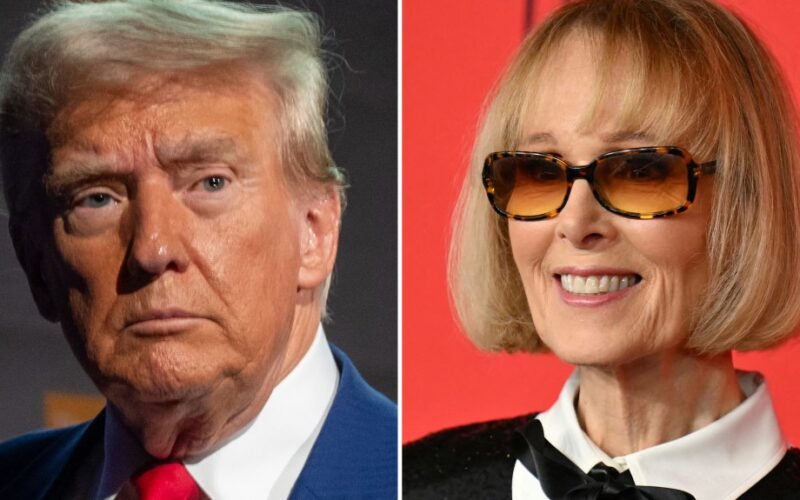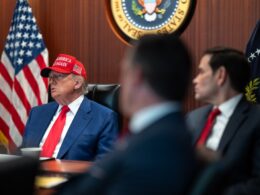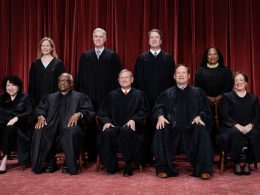E. Jean Carroll, the writer whom Donald Trump was found liable for sexually abusing and defaming, continues to receive “truly graphic and horrifying” rape and murder threats daily, her attorney told a federal appeals court in New York Tuesday.
Carroll’s lawyer, Robbie Kaplan, invoked the threats while asking the 2nd Circuit Court of Appeals to reject Trump’s efforts to throw out a lower court’s finding that he defamed Carroll in response to her allegations he raped her and the subsequent $83.3 million judgment awarded to her by a jury. Last week, the appeals court refused to let Trump swap himself out with the U.S. government as the defendant in the case.
Asked to justify the mammoth award, Kaplan on Tuesday told the appeals court the judgment accounted for Carroll, 81, losing her career as a leading advice columnist for Elle, the drying up of freelance work, the drastic measures she’s taken to protect herself, and the abuse Trump continued to hurl at her during the trial and after, resulting in ongoing threats to her safety.
“Including from the truly horrific rape and death threats she continues to receive almost every day,” Kaplan said. “They threaten her with rape and with killing by possibly every means known to man, by gun, by strangling, by disemboweling.”
Carroll brought — and won — two Manhattan Federal Court lawsuits against Trump. The first, filed in 2020, concerned infamous statements he made as president, calling her a liar and “not my type” after she first levied rape accusations. The second suit, in 2022, was made possible by New York’s now-expired Adult Survivors Act and accused him of rape and making additional defamatory statements after his first term in office.
As Trump bogged down the first suit with incessant appeals, the second lawsuit wound up going to trial first, resulting in a jury in May 2023 finding him liable for sexually abusing Carroll in a dressing room at Bergdorf Goodman in the mid-1990s and defaming her decades later, awarding some $5 million in damages. The 2nd Circuit upheld that verdict on June 6.
After the first trial, the jurist who presided over both cases, Manhattan Federal Judge Lewis Kaplan, ruled that Trump was also liable for defaming Carroll when he was president, as alleged in the first suit — as well as for comments that he made at a CNN town hall right after being found liable for sexual abuse — thus requiring the jury at the second trial in January 2024 to decide solely how much more money he owed.
The second jury awarded Carroll $83.3 million following a short damages trial in which the judge threatened to boot Trump from the courtroom for lambasting a “witch hunt” in front of the jury while Carroll was testifying, among other shenanigans.
Trump — now worth $5.2 billion, according to Forbes — has deposited $91.6 million with the court toward the second judgement as bond, but Carroll is yet to see a penny pending the outcomes of his legal challenges.
On Tuesday, Justin Smith, a lawyer for Trump, argued that the second judgment awarded to Carroll was too high. He also argued Trump should have been shielded by presidential immunity in the initial case because the comments were made in his official capacity as president.
“It is undisputed that the statements came from the White House, that they were in response to reporter inquiries about a matter of public interest, and that they were distributed through White House channels by the White House press office,” Smith argued.
“Despite this objective proof of official action, President Trump was denied the protection of presidential immunity. He was prevented from putting on critical evidence and from presenting the appropriate jury instruction.”

The 2nd Circuit previously rejected the legal position, holding that Trump’s lawyers missed the deadline for raising the presidential immunity defense by years.
On Tuesday, 2nd Circuit Justices Denny Chin and Maria Kahn asked Smith why Trump had previously waived the defense and didn’t appeal when the appeals court rejected his last effort to invoke immunity. Smith said the sweeping July 2024 ruling by the Supreme Court, which significantly broadened the legal protections afforded to presidents, changed everything. He said the decision didn’t concern the concept of waiving, but that it was covered in other legal precedent.
“[The decision] dealt with the fact that presidential immunity is now on par with the speech or debate clause,” Smith said, referencing immunity afforded to congressional legislators.
“Before then, this [2nd Circuit] panel compared presidential immunity to the absolute immunity enjoyed by the prosecutors and judges, which is waivable.”
Carroll’s lawyer countered that the case law was unambiguous, with the federal appeals court already ruling that Trump had waived the defense by not bringing it up at the start of the litigation.
“The Supreme Court reiterated a fundamental principle of our democracy: the president is not above the law. President Trump himself acknowledged that same principle at the very beginning of this case, when he represented to the state court judge who was then presiding, that E. Jean Carroll could pursue this action later, quote, when the president is no longer in office,” Kaplan said.
“It’s now been more than five years.”
Kaplan said the Supreme Court opinion made no difference — and only would have if it had addressed the question of waiving a defense.
“It doesn’t use the word ‘waiver,’” she said. “It doesn’t speak of the concept of waiver.”
The 2nd Circuit panel did not indicate when it would issue a decision.








